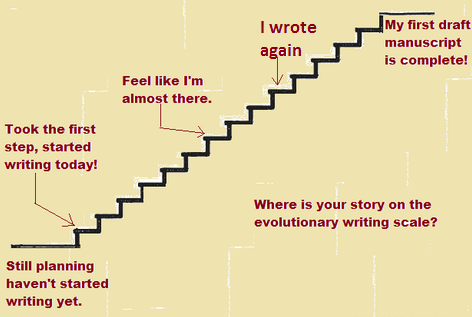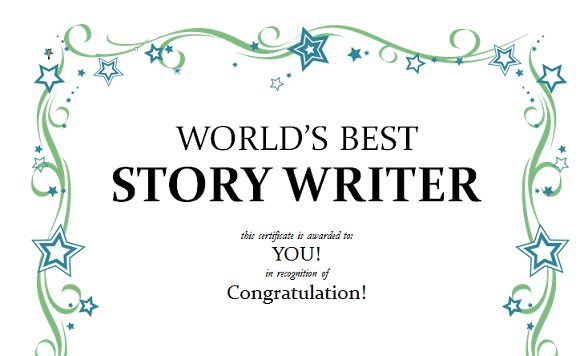
Let’s start with, what is writer’s block?
Well, I just sat down to write this post, and now I can’t think of a single darn thing to say. Oh well, I’m outta here!
Even if this particular situation doesn’t sound familiar to you, we’ve all experienced the phenomenon of absolutely intending to sit down and write something, usually driven by a work project, school assignment, or personal-deadline that we have imposed upon ourself, when! Uh, I can’t think of what the word is. . . oh, yes, it’s on the tip of my tongue . . . it’s:
WRITER’S BLOCK!!!!
Whew! I feel so much better just getting that out of my head
and onto the page!
Writer’s block is the patron demon of the blank page.
You may think you know EXACTLY what you’re going to
write, but as soon as that evil white screen appears before you, your mind suddenly goes completely blank. And I’m not just talking about the Zen meditation stare-at-the-wall-until-enlightenment-hits kind of blankness.
I’m talking about sweat trickling down the back of your neck, anguish, panic, and suffering that takes hold of you so tight until the closer the deadline, self-imposed or otherwise, the worse the anguish of writer’s block gets.
Having said that, let me say it again. “The tighter the deadline, the worse the anguish of writer’s block gets.” Now, can you figure out what might possibly be the cause of this horrible plunge into speechlessness?
The answer is obvious: FEAR! You are terrified of that blank page. You are terrified that you have absolutely nothing of value to say. You are afraid of the fear of writer’s block itself!
It doesn’t necessarily matter if you’ve done a decade of research and all you have to do is string sentences you can repeat in your sleep together into coherent paragraphs. Writer’s block can strike anyone at any time. Based in fear, it raises our doubts about our own self-worth, but it’s sneaky. It’s writer’s block, after all, so it doesn’t just come and let you know that. No, it makes you feel like an idiot who just had your frontal lobes removed through your sinuses. If you dared to put forth words into the greater world, they would surely come out as gibberish!
Let’s try and be rational with this irrational demon. Let’s make a list of what might possibly be beneath this terrible and terrifying condition.
- Perfectionism. You must absolutely produce a masterpiece of literature with your first draft. Otherwise, you qualify as a complete failure.
- Editing instead of composing with writer’s block seated firmly on your shoulder, yelling as soon as you type “I was born?,” no, not that, that’s wrong! That’s stupid! Fix it, fix it, fix it!
- Self-consciousness. How can you think, let alone write, when all you can manage to do is pry the fingers of writer’s block away from your throat enough so you can gasp in a few shallow breaths? You’re not focusing on what you’re trying to write, you’re focusing on those gnarly fingers around your windpipe.
- Can’t get started. It’s always the first sentence that’s the hardest. As writers, we all know how EXTREMELY important the first sentence is. It must be brilliant! It must be unique! It must hook your reader’s from the start! There’s no way we can get into writing the piece until we get past this impossible first sentence.
- Shattered concentration. You’re cat is sick. You
suspect your mate is cheating on you. Your electricity
might be turned off any second. You have a crush on
the local UPS deliveryman. You have a dinner party
planned for your in-laws. You . . . Need I say more.
How can you possibly concentrate with all this mental
clutter? - Procrastination. It’s your favorite hobby. It’s
your soul mate. It?s the reason you’ve knitted 60
argyle sweaters or made 300 bookcases in your garage
workshop. It’s the reason you never run out of Brie.
FACE IT ? IT?S ONE OF THE REASONS YOU HAVE WRITER’S
BLOCK!
How to Overcome Writer’s Block
Okay. I can hear that herd of you running away from
this article as fast as you can. Absurd! you huff.
Never in a million years, you fume. Writer’s block is
absolutely, undeniably, scientifically proven to be
impossible to overcome.
Oh, just get over it! Well, I guess it’s not that
easy. So try to sit down for just a few minutes and
listen. All you have to do is listen ? you don’t have
to actually write a single word.
Ah, there you all are again. I am beginning to make
you out now that the cloud of dust is settling.
I am here to tell you that WRITER’S BLOCK CAN BE
OVERCOME.
Please, remain seated.
There are ways to trick this nasty demon. Pick one,
pick several, and give them a try. Soon, before you
even have a chance for your heartbeat to accelerate,
guess what? You’re writing.
Here are some tried and true methods of overcoming
writer’s block:
- Be prepared. The only thing to fear is fear itself.
(I know, that’s a clich?but as soon as you start
writing, feel free to improve on it.) If you spend
some time mulling over your project before you
actually sit down to write, you may be able to
circumvent the worst of the crippling panic. - Forget perfectionism. No one ever writes a
masterpiece in the first draft. Don’t put any
expectations on your writing at all! In fact, tell
yourself you’re going to write absolute garbage, and
then give yourself permission to happily stink up your
writing room. - Compose instead of editing. Never, never write your
first draft with your monkey-mind sitting on your
shoulder making snide editorial comments. Composing is
a magical process. It surpasses the conscious mind by
galaxies. It’s even incomprehensible to the conscious,
editorial, monkey-mind. So prepare an ambush. Sit down
at your computer or your desk. Take a deep breath and
blow out all your thoughts. Let your finger hover over
your keyboard or pick up your pen. And then pull a
fake: appear to be about to begin to write, but
instead, using your thumb and index finger of your
dominant hand, flick that little annoying ugly monkey
back into the barrel of laughs it came from. Then jump
in ? quickly! Write, scribble, scream, howl, let
everything loose, as long as you do it with a pen or
your computer keyboard. - Forget the first sentence. You can sweat over that
all-important one-liner when you’ve finished your
piece. Skip it! Go for the middle or even the end.
Start wherever you can. Chances are, when you read it
over, the first line will be blinking its little neon
lights right at you from the depths of your
composition. - Concentration. This is a hard one. Life throws us
so many curve balls. How about thinking about your
writing time as a little vacation from all those
annoying worries. Banish them! Create a space, perhaps
even a physical one, where nothing exists except the
single present moment. If one of those irritating
worries gets by you, stomp on it like you would an
ugly bug! - Stop procrastinating. Write an outline. Keep your
research notes within sight. Use someone else’s
writing to get going. Babble incoherently on paper or
on the computer if you have to.
Just do it! (I know, I stole that line from
somewhere?). Tack up anything that could possibly help
you to get going: notes, outlines, pictures of your
grandmother. Put the cookie you will be allowed to eat
when you finish your first draft within sight ? but
out of reach. Then pick up the same type of writing
that you need to write, and read it. Then read it
again. Soon, trust me, the fear will slowly fade away.
As soon as it does, grab your keyboard ? and get
writing!








